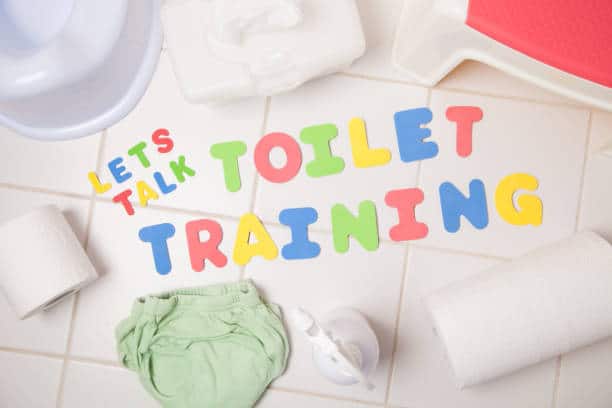Toddler Potty Training 101
Toddler Potty training your child is an important milestone for them. It can be hard to accomplish. Many parents despair that their child will never learn, or that they will need to clean up accidents for many years to come. The good news is, your child will learn how to go, even if it takes longer than you anticipate. Make sure to get the supplies ready, learn the how-to process, and look for the right milestones to know that now is the time! Toddler Potty-training your child does not have to be a hassle. This is a difficult time for children.
Understanding Toddler Potty Training
Children can be strong-willed. We need to comprehend the fact that they choose to be strong-willed when it is not needed. We can only hope they keep up the behavior when they grow into adults in much-needed areas of their lives. How do you stay patient despite your child’s stubbornness and above all, how do you maintain your sanity?
They are learning something entirely new that is completely out of the scope of their lives, thus far and difficult for the parents because it is a mix of emotions about your children growing up and wanting to be done with diapers. The first thing you must do as a parent is getting over the emotionality of the situation. Your little one is growing up and that happens. This is important for them to learn and you need to be able to provide clear guidance on the subject. The toddler potty-training process is one that provides a great deal of stress and headaches to parents. Accidents are going to happen, and you might get to your wit’s end. You must stay positive and work through it to get your child where he or she needs to be. It is also possible to make toddler potty-training a relatively fun experience for both of you. The thing to remember is that every child is different.
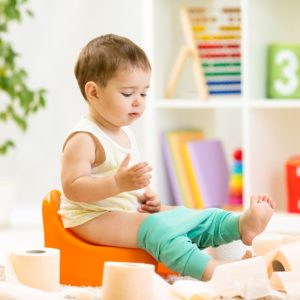
Child Readiness
The question as to whether or not your child is ready is one of the most difficult ones to tackle as well as the most important. There are many parents that are ready to potty-train right away, so they can be done with diapers. Unfortunately, if it is too early for your child, it can make the process long and arduous. You cannot force a child before he or she is ready. There are some things to keep in mind about toddlers. As we said, every child is different. This means that every child is going to be ready at a different time. There is no standard right time to potty-train. There are some general guidelines though. Most children should be ready to potty-train between two and three years old. Girls will be ready to train sooner than boys. Boys are going to get a good command of urine control but have a harder time with bowel control. This begs the question of how to know when the child is ready.
Signs of Readiness
The good news is there are some distinct signs that may show the child is ready for potty training. Independence in a child can be a revealing sign that they are ready to potty train. There are several things to watch for that are just general associations with maturity and independence that tell you the child is ready to potty train. If the child can pull up and down his or her own pants, they imitate members of the family, they watch you on the toilet and ask questions, they want to do things by themselves, they like to wash their hands, they put their toys away, and they want to please you are all signs of mental maturity that indicates the child is capable of understanding the potty training principles.
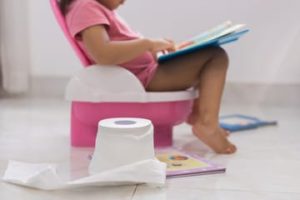
Physical Signs
There is a phase that many toddlers go through in which they are determined to defy you. This can be a difficult time to start potty training as they want to be stubborn. Once this phase passes, then it is a good time to consider toddler potty training. There are some things you need to do before potty training to appropriately prepare your child for the task.
Stays Dry for 3 Hours or More
Babies often have wet diapers when you check on them. As they grow into toddlers, their need to urinate lessens, so they are able to stay dry longer. If your little one can last 3 hours or more without peeing, then it is one physical sign of potty-training readiness.
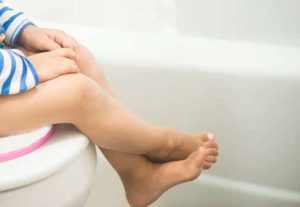
Has a Predictable Bowel Movement?
If you can predict your child’s bowel movement, then it is a signal that you can potty train them soon. This is the time when you already know when to rush them into the potty. They start to have their own schedule for pooping. You will then notice that they usually relieve on certain times of the day. For example, he/she poops twice: once at night and once in the morning or afternoon, and no other time; that is an example of a predictable bowel movement.
Runs and Walks Well
A toddler who is able to walk and run well is old enough to be potty trained. Some parents insist that they can potty train their 1-year-old, which is not impossible, but rare. The reason why running and walking well is in the checklist is that it determines whether your child has developed coordination, allowing them to handle their selves steadily.
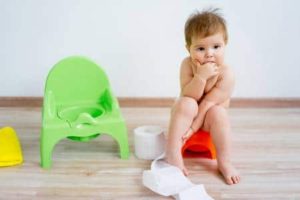
Shows Independence
Independence happens when your little one prefers to do things on their own, like drinking from their cup, opening the can of cookies and figuring out their puzzle toy. Taking pride in their own accomplishments is a sure sign of having independence. You will know that they thrive for independence when they prefer to feed their self or will not take a bite from their own food but wants to hold it their self-first.
Hating Dirty Diapers
Babies cry when they need changing, but most of the time, they do not seem bothered. As they turn into 1-year old, they seem not to care whether they have something of a burden down there because they are more engrossed with playing and exploration. With toddler potty-training-ready toddlers, a dirty diaper is can be horrifying. You will know your little one is ready for training when his wet and soiled diaper easily irritates him. It is not an average kind of irritation. If anything, it is more of a frustration. Your little one is obviously uncomfortable and turns red and angry about his itchy bottom. They get distracted, bothered and are unable to return to their playing because of constantly scratching at the dirty diaper.
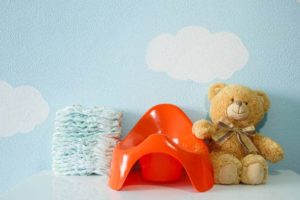
Shows Curiosity of the Toilet
Toddlers do not usually care when you go to the toilet or what you do in there. They only sometimes follow you because they need something, but once they start peeking in and wondering why you are sitting there for so long, it is a sign of a growing curiosity. When your little one is growing more curious about the toilet, it means that he or she is trying to understand what it is for. The more they search for the importance of the “toilet”, is when they increase the chance of being ready for potty training.
Verbalizes when they have Soiled their Diaper
When your toddler reaches 2 years of age, they will know and start to use words for peeing and pooping. A more obvious sign of readiness is when your little one is able to tell you, out of the blue sometimes, that he or she has peed or pooped. Most of the time, toddlers will tell you of their little deed when it is over, but sometimes, they will be able to tell you before or as it happens. The more frequent your little one is able to verbalize their need to relieve their self, the more you can expect to be able to train them for the toilet.
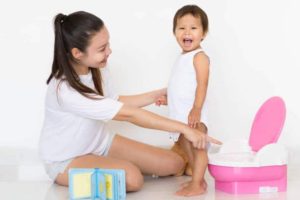
It Becomes Obvious that they are Doing their Business
You are not usually able to predict when your child will soil their diaper, but as they grow older, it becomes more apparent. One sign of readiness to watch out for is when your little one is having a particular behavior or manner before he or she does their business. Some of these behaviors include:
• Walking around as if pondering
• Isolating their self from others
• Staying put in one place, longer than they usually do
• Playing while standing up, or refusing to sit their bum down
• Staring in one direction or looking extremely focused
• Grunting, clenching or pursing their lips
Your little one may have their own kind of behavior that is not found above, so you will have to observe what they usually do before they poop. If you see a pattern in their behavior, then that would be a good sign for getting ready.
Sits on the Potty Trainer Whenever
If you have already bought a potty trainer but had it set aside, put it where your little one can see and access it anytime. As it has been said, growing curiosity is one of the main signs of readiness and when your toddler is curious enough, he or she will occasionally “use” the potty trainer. On random times, or when they feel like imitating you, they will go to the potty trainer, lift up the lid, sit on it and maybe even say “poo poo”. Their awareness of the trainer’s purpose is a great precursor so that they won’t be afraid of it in the future. Keeping the potty trainer in sight also helps your little one become familiar with it and feel comfortable about it to begin training soon.
The ability to Removes their Pants Down or Pull it Up
If your little one can pull down their pants on their own, then you can train them to remove it soon when they need to relieve their self. The reason why they should be able to pull their pants up as well before training is because this indicates that they have now, again, coordination and independence. It is also important in teaching them not to soil their underwear and that deed is for the potty alone.
Can Sit on their Own for 2 to 5 Minutes
One of the biggest challenges most parents encounter while potty training is keeping their child still on the potty. An uninterested and irritated child on the potty is not a ready toddler. If your toddler can sit on their own for at least 2 minutes and as much as 5 minutes, then they can last sitting on the potty until their deed is over. Without this particular behavioral sign, potty training can be prolonged or extremely difficult to accomplish.

Generally, Cooperative
Toddlers do not always follow your instructions, and sometimes deliberately do the exact opposite of what you ask just to test the boundaries. If your little one is cooperative enough, if not most of the time, they can be potty trained easily. You can teach an obedient or cooperative toddler to stay put or take off their pants when it is time to go. You will be spared from the scene of running after them when they suddenly sprint for the door before they are even done with their business.
Cognitive Signs
Knows the Word for Poop and Knows Its Meaning
If your little one knows the word for poop and what it means, this thinking is well developed enough to know that there is also a calling for every action When your toddler knows the meaning of each action, especially when they are about to go, then they can interpret or anticipate it when it is about to happen. This is an important precursor to them being able to identify their own needs and therefore tell you of it sooner.
Is Aware of the Physical Signals of Going and Tells
Toddler Potty training is best for a toddler who is aware of their body when they must go. This means your little one can tell that they are about to either pee or poop and can tell you before it happens. Some toddlers will hold it in until you come to the rescue and take them to the potty. This cognitive sign is a go signal for potty training. At this point, your little one is able to communicate their needs soon enough for you to be able to give a solution to it quickly.
Can Follow Instructions
If your child is able to follow instructions like “Put your toys back in the box,” and “Hand me your bag”, they will surely be able to cooperate with you. Not only will they be able to do as you teach them during potty training, he or she will also be able to follow what you ask them not to do.

Can Put Things Back in Place
When your little one is able to put things back in place, all on their own, their cognitive function is well developed enough that they understand there is a place for everything. You will know this when they do things like:
• Place their slippers on the rack after using it
• Returns their toys in the box before sleeping
• Puts their dirty clothes in the laundry
• Throws small trash into the bin
• Covers the cookie jar after stealing a treat
Over time, this behavior becomes more of a natural routine. This is where your little one starts becoming aware where each thing belongs. With this knowledge, they will be able to understand that even their little deed has a place and will be able to train their self, with your help, to do it routinely.
Potty Preparation
Children do not train themselves to potty appropriately most of the time. There are some anomalies, but these are few and far between. The expectations for potty-training need to be set and ample guidance provided to help the child understand what to do.
Understanding
The best thing you can do to prep your child for potty training is to make sure they are familiar with the equipment involved and the procedures. Just like an adult learning something new, you want to get familiar with the equipment and process. This will make it much easier on the child to learn. The first thing to do is take the child into the bathroom with you.
Generally, the person of the same sex of the child is best. Even consider brothers and sisters; they are often always ready to help out. There are many parents out there that are uncomfortable with this. Unfortunately, you have to get over it. Another thing to keep in mind is that if there are other kids around, like at daycare, your child is going to see other kids using the bathroom, so you are not the only option for role models.
Association
Talk to the child about the feelings they are having. You want to talk about the feelings like being wet, about to be wet, etc. You also want to talk about the sensations that they are feeling so they can start to associate those sensations with time to go to the bathroom. Help your child make the associations when you see changes in behavior that are signs of going potty. This gives them time to think about it and make the connection between what they are feeling and what they are about to do.
Allowing the child to spend some time nude is going to help create awareness as well. This lets the child see what happens when they feel a certain way. This helps the child to put all the pieces together about how they feel, what happens and what they should do. By making a habit of changing their diaper in the bathroom will help to cement this association. This should be done from an early age. This creates the association that the bathroom is where the potty happens…..
Learn more about Potty-Training >>> https://www.mayoclinic.org/healthy-lifestyle/infant-and-toddler-health/in-depth/potty-training/art-20045230
https://nanniesandkidsunited.com/diaper/
FREE E-BOOK
A STEP-BY-STEP WORKING STRATEGY FOR PARENTS ON HOW TO POTTY TRAIN THEIR CHILDREN IN 3 DAYS >>> https://linktr.ee/nanniesandkidsunited
Nannies and Kids United is a babysitting service agency located in the state of Georgia. The agency places qualified childcare professionals with families or individuals seeking childcare assistance for their little ones in home. With our E-books, we also specialize in providing guidance to individuals navigating parenthood while raising their children. For continuous updates, subscribe to our newsletter on our website and follow us on social media. We can be found on Facebook, Twitter, Instagram, LinkedIn, and Pinterest. Happy Parenting!!

